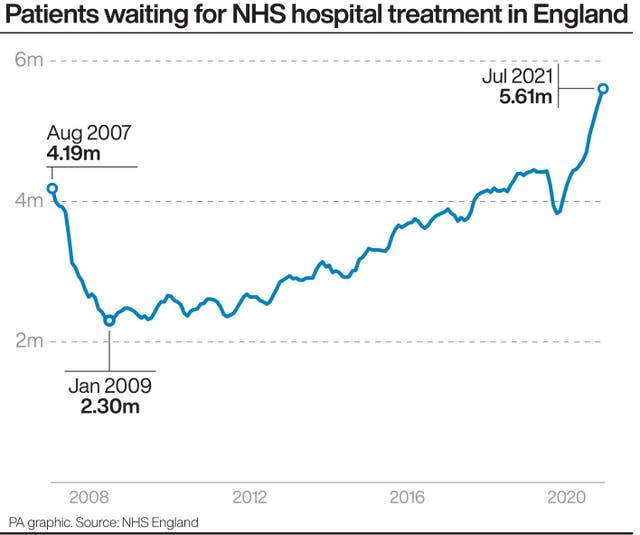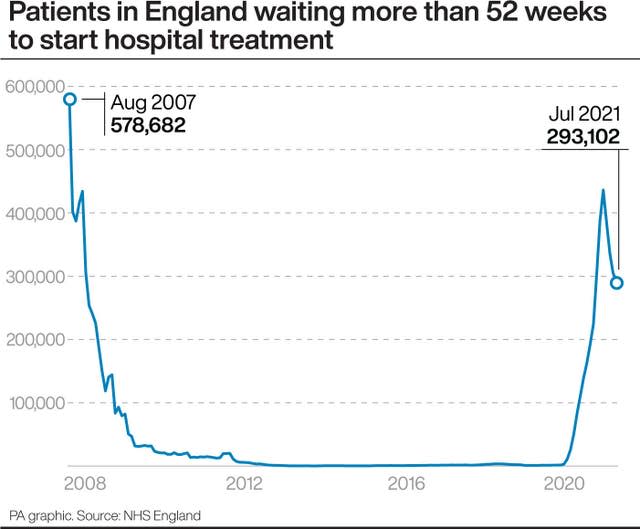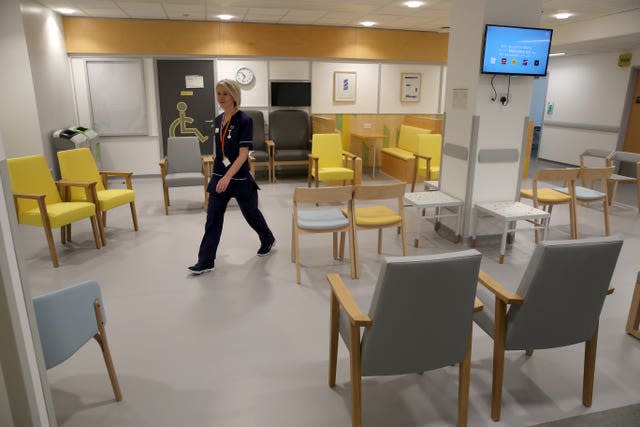Record NHS waiting lists will continue to grow, Javid warns
The number of people in England waiting for hospital treatment has reached a new record level and patients have been warned it will go even higher.
A total of 5.6 million people were waiting to start treatment at the end of July, according to new figures from NHS England.
This is the highest number since records began in August 2007 and includes those waiting for hip and knee replacements and cataract surgery.
Health Secretary Sajid Javid warned the number of people on waiting lists will continue to increase before the billions of pounds being pumped into the NHS starts to address the problem.

The number having to wait more than 52 weeks to start treatment stood at 293,102 in July 2021, down from 304,803 in the previous month, but more than three times the number waiting a year earlier, in July 2020, which was 83,203.
Mr Javid told the PA news agency: “The waiting lists will go up before they go down again.”
The Health Secretary, on a visit to Moorfields Eye Hospital in London, added: “We’ve seen that around seven million people haven’t come forward in the normal way because of the pandemic.
“We want them to come forward and we want to tell them the NHS is open for them.
“But I know with this catch-up fund, and the innovation the NHS can do, we can tackle the waiting lists.”
He promised the wider use of “surgical hubs” able to treat more patients, more quickly, as Moorfields was doing for cataract procedures.
“What I’ve seen here today is a great example of how hospitals can plough through the waiting list,” he said.
Siva Anandaciva, chief analyst at The King’s Fund health think tank, said: “There are over 5.6 million people waiting for care already, often in pain and dealing with the uncertainty of when they will be treated.

“All NHS services are affected, with primary care, hospital care and mental health services seeing the demand for care rise as the immediate threat of Covid-19 recedes.
“Even before Covid-19, waiting lists for treatment had substantially worsened.
“The significant investment the Government has now promised is very welcome but will not lead to an increase in the number of hospital beds or clinical staff overnight.”
The new tax rises announced by Boris Johnson will help pump an extra £36 billion into health and social care over three years but ministers have been unable to guarantee that will be enough to clear the backlog in the NHS.
The latest data shows the total number of people admitted for routine treatment in hospitals in England in July 2021 was 259,642, up 82% from a year earlier (142,818), although this reflects lower-than-usual figures for July 2020, which were affected by the first wave of the Covid-19 pandemic.
The equivalent figure for July 2019, a non-pandemic year, was 314,280.
NHS England said many more tests and treatments have been delivered this summer compared with last, while hospitals cared for thousands more patients with Covid.
It said there were 3.9 million diagnostic tests and 2.6 million patients started consultant-led treatment in June and July, compared with 2.7 million tests and 1.6 million treatments over the same time last year.

This came as the number of Covid patients in hospital grew from under 800 at the start of June to more than 5,000 at the end of July.
There are now more than 6,300 Covid patients in hospital, compared with fewer than 600 this time last year.
NHS England also pointed to data showing that almost half a million people were checked for cancer in June and July, among the highest numbers on record.
Professor Stephen Powis, national medical director for NHS England, said: “Caring for 450,000 patients with the virus has inevitably had a knock-on effect on less urgent care and left a backlog but staff are working around the clock to make the best possible use of Government investment to treat as many people as possible.”
The new data showed that more than 325,000 patients in England had been waiting more than six weeks for a key diagnostic test in July.
A total of 325,229 patients were waiting for one of 15 standard tests, including an MRI scan, non-obstetric ultrasound or gastroscopy.
The equivalent number waiting for more than six weeks in July 2020 was 489,797, while pre-pandemic in July 2019 there were 37,206.
Ambulance data also shows that those people needing ambulances for life-threatening conditions are often waiting longer than the target of seven minutes.
In August, the average response time was around eight-and-a-half minutes.
Tim Mitchell, vice president of the Royal College of Surgeons, said the overall data showed 7,980 patients waiting more than two years for treatment.
The longest waits were for trauma and orthopaedic treatment such as hip and knee replacements, followed by general surgery such as gallbladder removals and hernia operations.
He said: “Behind these eye-watering statistics are patients waiting in pain for hip and knee replacements and for heart, brain and other operations.
“Without surgery, many would be left unable to work or carry out everyday activities, their quality of life greatly diminished.
“We realise that reducing this enormous backlog will require commitment and a great deal of hard work from frontline NHS staff.
“However, as this week’s plan from the Government acknowledges, we also need extra capacity in the NHS, through the creation of new surgical hubs.
“The NHS will also need doctors, nurses and surgeons to staff these hubs, which requires long-term investment in our workforce.”


